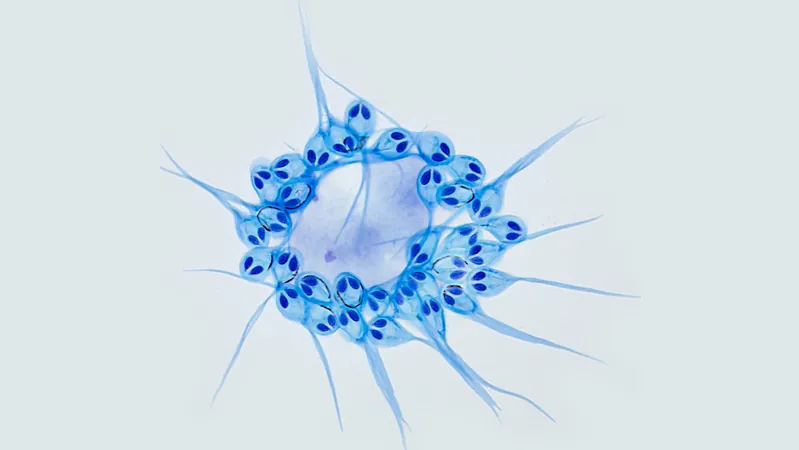
Groundbreaking Discovery: The Oxygen-Independent Life of Henneguya salminicola
2025-01-12
Author: Benjamin
Groundbreaking Discovery: The Oxygen-Independent Life of Henneguya salminicola
In a remarkable scientific revelation, researchers have uncovered that Henneguya salminicola, a parasitic myxozoan closely related to jellyfish, has completely shed its mitochondrial genome, allowing it to thrive without oxygen. This finding challenges long-held assumptions about the necessity of aerobic respiration in animal life forms.
Aerobic respiration has typically been viewed as a fundamental characteristic of eukaryotic organisms. However, as lifestyles evolved in various eukaryotic lineages, some have adapted to environments devoid of oxygen, leading to a loss of mitochondrial functions. What makes Henneguya salminicola's case particularly fascinating is that it represents a multicellular organism exhibiting this trait.
Using advanced deep sequencing techniques combined with meticulous microscopic analyses, scientists demonstrated that H. salminicola has lost critical genes associated with aerobic respiration and mitochondrial replication. While the myxozoan contains structures resembling mitochondria, these mitochondrion-related organelles (MROs) lack the necessary genomic components for oxygen-based energy production.
This study’s findings not only shine a spotlight on the unique metabolic pathways present in H. salminicola but also provide broader insight into evolutionary adaptations. "Our work indicates that the ability to survive without oxygen is not solely confined to unicellular organisms but has also been adopted by multicellular creatures," said an anonymous researcher involved in the study.
In contrast to H. salminicola, another myxozoan—Myxobolus squamalis—was found to retain its complete mitochondrial genome, underscoring the unique evolutionary path that H. salminicola has taken. Microscopic analyses revealed the stark difference between the two: while M. squamalis showcases abundant mitochondrial DNA, H. salminicola astonishingly does not.
This discovery opens a window into understanding evolutionary transitions from aerobic to anaerobic lifestyles in complex organisms. "Henneguya salminicola serves as an exceptional model for studying loss-of-function adaptations," the researchers concluded.
This extraordinary finding not only redefines our understanding of metabolism and evolutionary biology in multicellular organisms, but it also raises intriguing questions about other species that may have similarly adapted to hypoxic environments. Future research could unlock secrets about the evolutionary responses to varying environmental pressures, making H. salminicola a pivotal subject in the study of life’s versatility.
Stay tuned for more developments in biological discoveries that could change the way we view life and survival on our planet!



 Brasil (PT)
Brasil (PT)
 Canada (EN)
Canada (EN)
 Chile (ES)
Chile (ES)
 Česko (CS)
Česko (CS)
 대한민국 (KO)
대한민국 (KO)
 España (ES)
España (ES)
 France (FR)
France (FR)
 Hong Kong (EN)
Hong Kong (EN)
 Italia (IT)
Italia (IT)
 日本 (JA)
日本 (JA)
 Magyarország (HU)
Magyarország (HU)
 Norge (NO)
Norge (NO)
 Polska (PL)
Polska (PL)
 Schweiz (DE)
Schweiz (DE)
 Singapore (EN)
Singapore (EN)
 Sverige (SV)
Sverige (SV)
 Suomi (FI)
Suomi (FI)
 Türkiye (TR)
Türkiye (TR)
 الإمارات العربية المتحدة (AR)
الإمارات العربية المتحدة (AR)